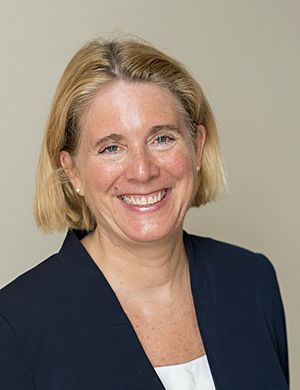Jacqueline Hewitt facts for kids
Quick facts for kids
Jacqueline Hewitt
|
|
|---|---|
 |
|
| Born | September 4, 1958 Washington, D.C. |
| Alma mater | Bryn Mawr College Massachusetts Institute of Technology |
| Awards | Annie Jump Cannon Award in Astronomy |
| Scientific career | |
| Fields | Astrophysics |
| Thesis | A search for gravitational lensing (1986) |
| Doctoral students | Christopher Williams |
Jacqueline Nina Hewitt, born on September 4, 1958, is an American astrophysicist. This means she is a scientist who studies space and the universe. She made a very important discovery: she was the first person to find something called an Einstein ring. She is also a respected member of the American Astronomical Society.
Contents
Early Life and Education
Jacqueline Hewitt was born in Washington, D.C. Her parents were Warren E. Hewitt and Gertrud Hewitt. Her father was a lawyer.
She went to Bryn Mawr College and finished her studies in 1980. She earned a degree in economics. During her second year, she took an astronomy class at Haverford College. This class made her very interested in science.
After college, she went to the Massachusetts Institute of Technology (MIT) for graduate school. There, she started studying something called gravitational lensing. She used a special radio telescope called the Very Large Array. In 1986, she earned her Ph.D. in physics.
Discovering Einstein Rings
After finishing her Ph.D., Dr. Hewitt worked at MIT. She was looking at data from her studies. On her computer screen, she saw a strange ring shape. This ring was part of a gravitational lens system. It turned out to be the very first Einstein ring ever discovered!
An Einstein ring happens when light from a distant object, like a galaxy, bends around a massive object, like another galaxy, that is closer to us. This bending of light makes the distant object look like a ring. It's like looking through a giant cosmic magnifying glass.
Since Dr. Hewitt's amazing discovery, many more Einstein rings have been found. Scientists now know they are more common than they first thought. These rings are important because they help us learn about the size and future of our universe.
In 1988, Dr. Hewitt worked as a researcher at Princeton University. A year later, she returned to MIT. She became a physics professor there in 1989. She also leads the Radio Astronomy Group at MIT's Research Laboratory of Electronics. Since 2002, Dr. Hewitt has been the Director of the MIT Kavli Institute for Astrophysics and Space Research.
Awards and Recognition
Dr. Hewitt has received many honors for her work.
- In 1990, she won a fellowship from the David and Lucile Packard Foundation.
- Her colleagues at MIT nominated her for the Harold E. Edgerton Award in 1995–1996.
- In 1995, she received the Maria Goeppert-Mayer Award.
- In 1989, she won the Annie J. Cannon Award in Astronomy for her work in radio astronomy.
In 2020, she was chosen as a Legacy Fellow of the American Astronomical Society. This is a special honor from her fellow astronomers.
Personal Life
Jacqueline Hewitt has two children. Her son Keith was born in 1988, and her son Jonathan was born in 1993.
See also
 In Spanish: Jacqueline Hewitt para niños
In Spanish: Jacqueline Hewitt para niños
 | James Van Der Zee |
 | Alma Thomas |
 | Ellis Wilson |
 | Margaret Taylor-Burroughs |

